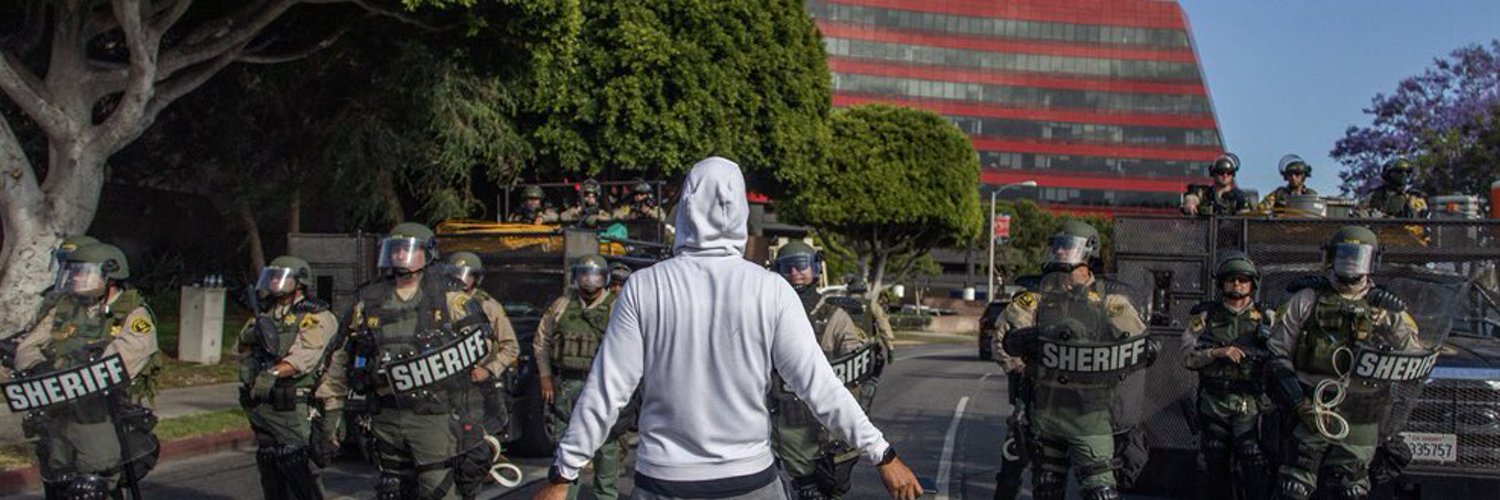[dropcap size=big]W[/dropcap]William G. is just trying to get his steps in, and expose all the "dirty" cops he sees along the way.
“I try to get 25,000 steps in a day. I start my day early, and I walk, and I walk.” These days, his walks are punctuated by a new activity: filming LAPD officers in Hollywood. William, who works in finance and preferred not to share his full name, is better known as @FilmThePoliceLA on Twitter. William’s feed documents the LAPD Hollywood Division’s everyday misconduct: maskless officers, unnecessary searches, young Black men handcuffed during traffic stops.
“You’d be surprised what’s going on between one and three in the morning,” he tells L.A. Taco. “That’s the time when the cops are running wild.”
William was not always a critic of the LAPD. “I’ll admit I was probably a little bit of a bootlicker not so long ago,” he said. “I used to hear from people about their police interactions and think they’re overblown, so I didn’t experience the same thing. I wasn’t living in South Central; I was living in Brentwood.”
The cops then whisper in the kids’ ears *not to talk to me* (see: 6 second mark).
That’s pretty outrageous. He’s a dirty cop. (2/...) pic.twitter.com/v8G9F17CbG
— Film The Police (@FilmThePoliceLA) February 22, 2021
But when he moved to Hollywood, things started to change. “I used to have these little police interactions that pissed me off. ‘Where are you going?’ It’s none of your business,” he said. “I don’t think you’re going to ask someone over in Brentwood who’s wearing sweat pants what they’re doing at 5 AM.”
Like many, William’s perspective on policing made a major turn this May, as George Floyd and Breonna Taylor’s deaths ignited protests against police abuse across the country. “Things really switched on a specific day,” he said. “It was right when the protests first started, with the curfew in place.. The sheriffs were flying around, shooting anything that moves with pepper balls. We pulled an injured kid in. It was really traumatic.”
William attended several protests against police violence but quickly grew frustrated. “How many times can we go out and hold signs?” he continued. “I was really angry, and I wanted to get them back.” A memo released by the police chief in May allowed William to do just that. “I saw Michel Moore released saying that law enforcement employees must wear a mask. I’m gonna go around and tape cops not wearing masks.”
The LAPD’s complaint process can take over a year, so for now, William is mostly in the dark. “Either they’re going to sustain the complaints, or I’m going to expose the complaint process as the joke that it is,” he said.
“Rather than just walking past stops, I’d stop and film,” William said. “I became more and more disturbed. There were times I’d go for a walk and film five stops in an hour and a half. All of them would be fucked up. Obvious constitutional violations. Searching people for no reason.”
As William’s cop-watching began to fill more and more of his time, his motivation to fight back against perceived bullies only grew stronger. William, a Black man, was particularly struck by the evidence of racial profiling he saw on his nightly walks. “I’m a bit of a sucker because I thought that claims of police bias were a bit overblown,” he said. “What I see now is that whites are treated night-and-day differently than young Black people, 100% of the time.” Recently, he went as far as to tell his 22-year-old son to avoid the area. “He’s not allowed to come to Hollywood unless I know about it, and he’s not allowed to drive.”
Dozens of official complaints against officers, along with the video evidence behind them, now fill William’s Twitter feed. He avoids taking his complaints directly to the station, instead choosing to send them directly to the LAPD’s Office of the Inspector General via Twitter. The LAPD’s complaint process can take over a year, so for now, William is mostly in the dark. “Either they’re going to sustain the complaints, or I’m going to expose the complaint process as the joke that it is,” he said.
“If someone’s being wronged, it gives me a huge motivation.”
The most severe complaints document cases where young men, mostly Black, are pulled out of their cars and put into cuffs over routine traffic stops. “There are times when I’m literally reading the handcuff protocol to them verbatim off my phone as [officers] shake their heads and say ‘that’s wrong,’” William said. “They don’t know the rules, especially the younger ones. They don’t have enough training.
In the time he’s done this work, William has seen some promising changes. “I think the Inspector General is starting to get a little bit of backbone,” he said. “I want to push these people to get something done, and if they’re not going to do it, I want to expose the entire process.”
But until the culture and behavior of the LAPD changes, William will be out there each night, holding cops accountable and getting his steps. “When I get motivated on something, I’ll be relentless,” William said. “If someone’s being wronged, it gives me a huge motivation.”






